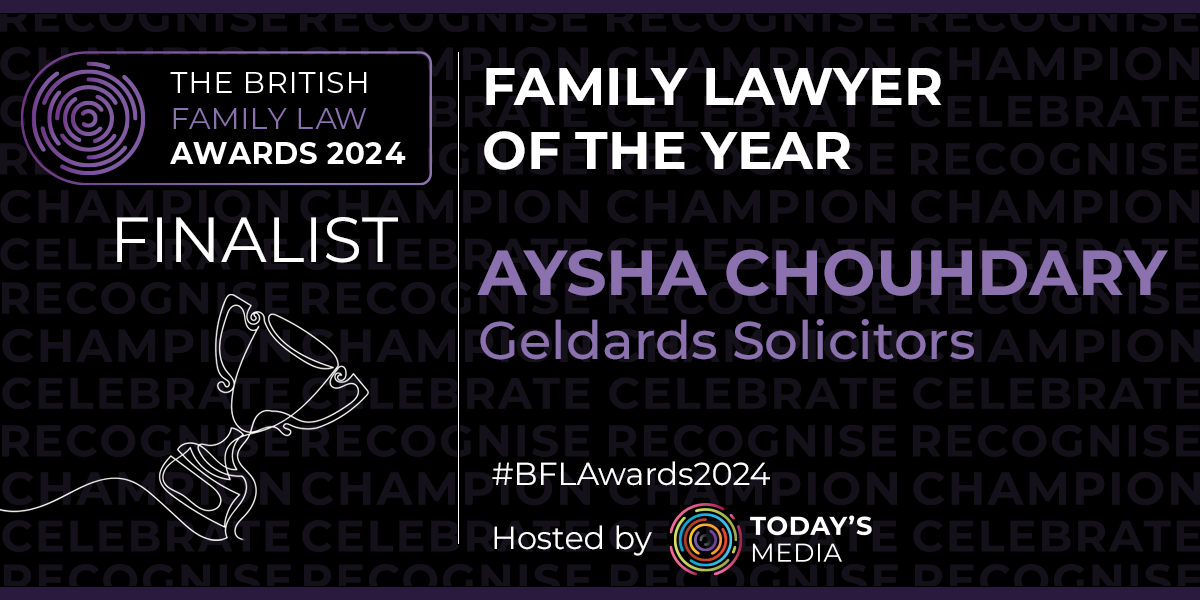Shariah Family Law & Divorce in Islam
Ending an Islamic Marriage can be a very stressful time, our highly experienced team of specialists understands its unique challenges and will guide you through the process to achieve the best outcome for you and your family. Our specialist family law team can assist with a wide range of family issues/matters including the dissolution of marriage under Islamic or Shariah/Sharia Law.
We provide tailored assistance to our Muslim clients, whether they are based in the UK or abroad, on all matters relating to Islamic Family Law. We understand that our clients have different needs, based on their religion and culture, and we pride ourselves in being able to provide a holistic service in multiple languages (including Urdu, Punjabi, Hindi and Mirpuri/Pothwari), that takes into account both international and religious laws.
What is Shariah/Sharia Family Law?
Muslim clients have additional needs and issues that need addressing as part of their family law matter. Muslims live their lives according to Shariah ruling and guidance which comes into play with their personal relationships too. Shariah Family Law focuses on both the civil and religious aspects.
The Shariah/Sharia Family Law services we specialise in
- Nikah contracts alongside prenuptial agreements (if necessary/appropriate).
- Mahr issues (at the time of the Nikah and upon divorce).
- Validity of marriage, validity of divorce and financial orders obtained abroad.
- Shariah or Sharia divorce.
- International divorces and assets.
- Financial matters – both religious and civil aspects.
- Arrangements for children – considered alongside special Muslim celebrations like Eid.
What is the procedure of divorce in Islam?
Multiple types of Islamic divorce exist, which follow a variety of procedures. While the Quran indicates that marriage is intended to be permanent, it also provides provisions for spouses to separate and terminate the marriage.
Types of Islamic divorce
- Talaq – ending of the marital relationship by the instigation of the husband (by his choice and his consent). This involves specific, well-known phrases, with the intention to divorce (such as ‘I divorce you’).
- Khula – also known as Khula or Khul, where the wife initiates the divorce proceedings, and the husband and wife both agree on the terms of the divorce, usually regarding the repayment of Mahr (dowry given to the wife by the husband upon marriage).
- Faskh-e-Nikah– this is the dissolution of the Islamic marriage, pronounced by a Shariah Court, upon application by the wife. Faskh is not uttered by the husband nor is it conditional upon his consent or choice. Faskh can only occur when there is a significant reason making it necessary or permissible such as financial difficulty on the part of the husband, presence of a defect preventing intimacy etc. If the ruling is in the wife’s favour, then she does not have to return the Mahr.
- Tafweed-e-Talaq – when the right of a woman to divorce is included in the marriage contract (i.e., delegated to her or a third party, like her parents). This can be with or without stipulating conditions. It is important to, therefore, consider receiving advice from a Specialist Family Lawyer at the point of the Nikah being drafted.
Talaq, the most common type of Islamic divorce, can be divided into two categories:-
Revocable Talaq
This is where the husband divorces his wife for the first or second time, without her offering him any compensation. It is permissible for him to take her back before her Iddah (stipulated waiting period) ends.
Irrevocable Talaq
A major irrevocable divorce occurs when a man issues a third divorce to his wife. In this situation, it is not allowed for the wife to reconcile with her husband unless she marries someone else in a legally recognised and genuine marriage, and the new husband then divorces her (known as the practice of Halala).
Minor irrevocable divorce is when the man divorces his wife for the first or second time, then her Iddah ends. It also applies when he divorces his wife in return for compensation or divorces her before consummating the marriage with her. In this case, it is permissible for him to take her back, but it must be with a new marriage contract and a new Mahr.
Immediate Talaq or subject to conditions:-
- Talaq with immediate effect e.g. when the husband says to his wife, “You are divorced” or other similar implicit words with the sole intention of divorce, without making the divorce conditional upon anything.
- Talaq which depends upon a condition – tied to a clear oath or clear condition e.g. “When the sun sets, you are divorced.”
Civil law overlap
Besides navigating the complexities of Shariah Family Law, it is also important to bear in mind that, if a couple has a valid marriage (under the jurisdiction of England and Wales) they should also consider a civil divorce, the arising matrimonial financial matters, and the arrangements for any children. A civil divorce would allow the divorcing couple to make various claims regarding income, capital, pensions, etc. Similarly, if there is not a valid marriage in place, there are other financial claims that can be explored. It is important to seek the assistance of a Specialist Family Lawyer familiar who can navigate the nuances of an Islamic marriage and divorce.
Languages we can provide services in
- Urdu
- Punjabi
- Hindi
- Mirpuri/Pothwari
- English
Why choose Geldards?
We have built up a reputation on an international scale with our team having received various accolades in multiple areas relating to both Shariah/Sharia Family Law and Family Law as a whole. We are currently the leading firm in this area, with a specialist Shariah/Sharia lawyer as part of our team who deal with International divorce.
Aysha Chouhdary is an experienced Family Lawyer who deals with complex religious and cultural matters (often with an international element) and is multilingual. If you would like to discuss your matter further, please contact Aysha at aysha.chouhdary@geldards.com.








